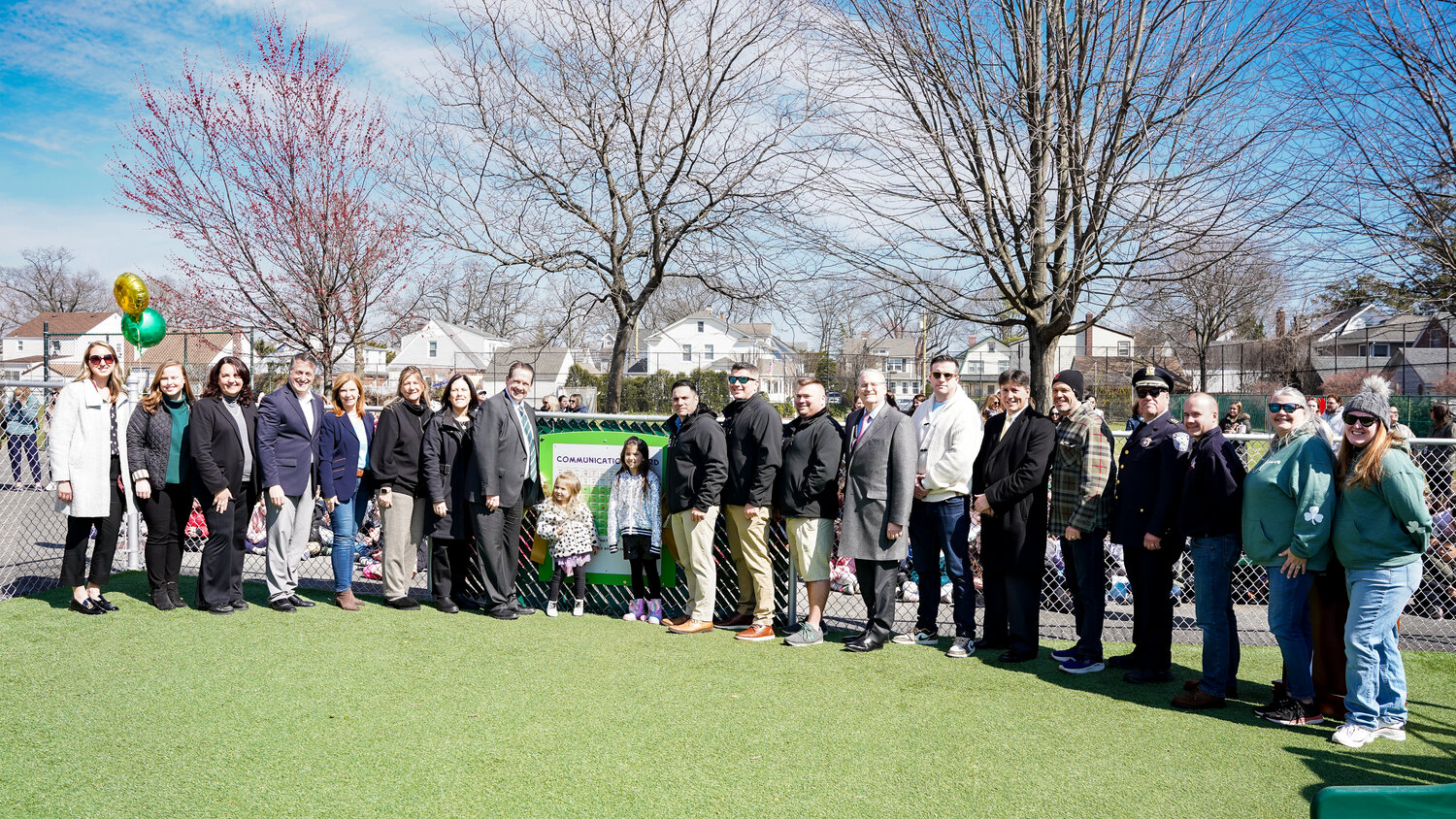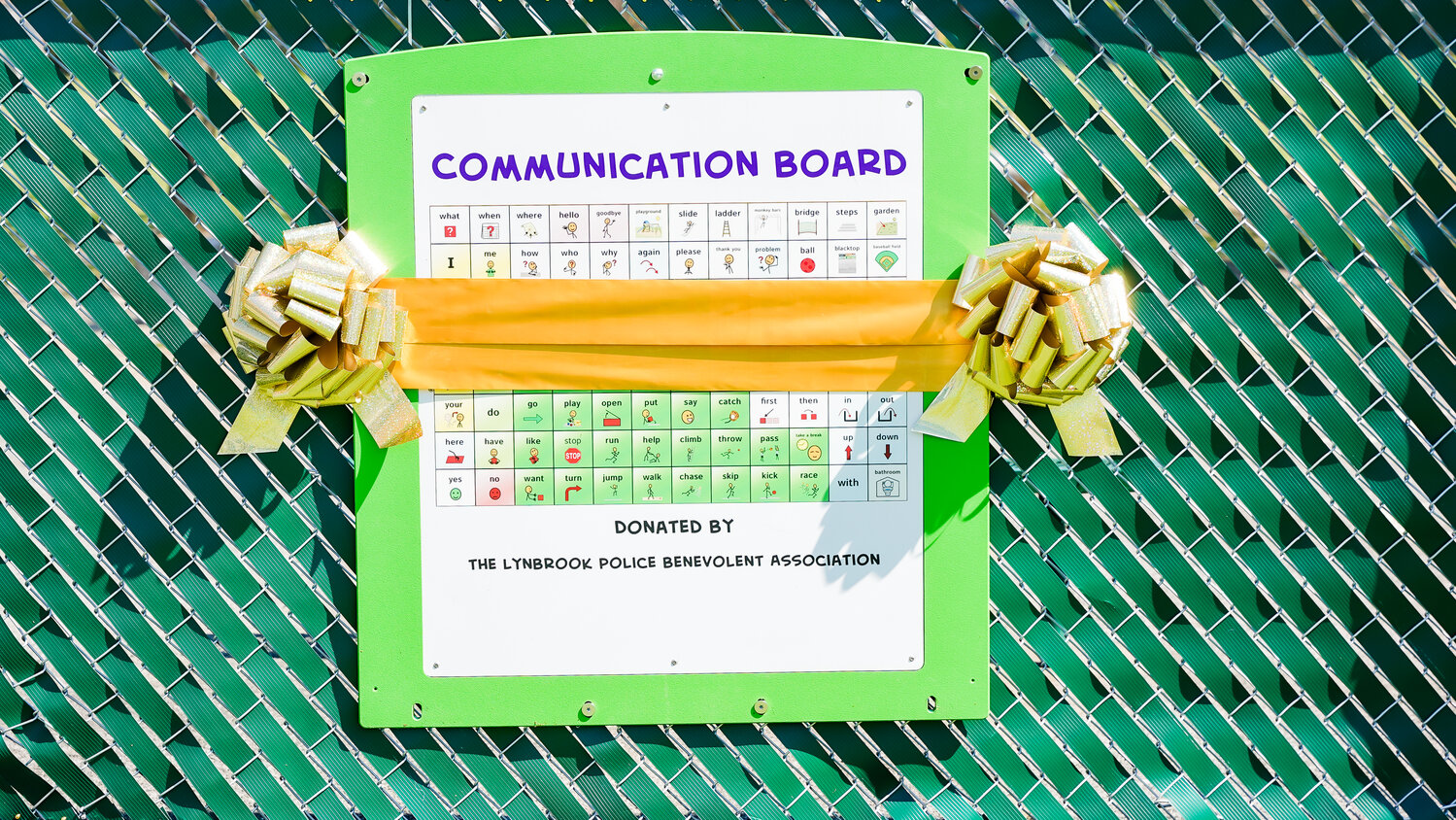Friday, July 26, 2024
‘Communication boards’ ease young, needy students’ interaction

Expressing emotions may come naturally for some children, but others may struggle to convey their feelings. This is why a group of Lynbrook parents made it their mission to enhance communication skills among kids.
With one simple board, students, especially those in special education, can now interact with their peers, family, and friends in ways that they couldn’t before. Dubbed Communication Boards, they were officially implemented in the Lynbrook community last Friday at a ribbon-cutting ceremony.
The Special Education PTA was behind the creation of the boards, which contain words and drawings like bathroom, walk, hot, cold, hungry, and more to make communication more seamless among students.
SEPTA board member Laura Macleish explained how her son is very limited verbally, so the Lynbrook School District provided him with an iPad to help him communicate better. On the iPad, there were 10 pages of various pictures, words, and other symbols that made it easier for him to demonstrate how he is feeling and what his needs are. Although this method helped Macleish’s son, she noted that it is hard for him to carry the iPad around with him on the playground.
“So that’s where these communication boards for him specifically come into such an important role,” Macleish explained. “Because he’s able to say ‘I have to go to the bathroom’ or he’s able to tell other children what he wants to do, which is really important.”
Macleish noted that there are several groups of students that might find the board useful. She said that emotionally delayed students can use the boards for backup communication or younger students that are still learning their words can benefit from these boards.
“I have a friend who is a nanny and she was so excited to use the board because she can point out ‘this is a slide’ to a baby,” Macleish said.
Macleish said that she and SEPTA President Abby Manasakis had a five-year plan, where they wanted to put the boards in every elementary school in Lynbrook. To their surprise, this five-year plan turned into a five-week plan due to the support from the Lynbrook Police Benevolent Association.
“The PBA was our first donor who helped us by generously donating the money we needed so we could get the boards in West End Elementary School,” Manasakis said. “And then we had another donor that stepped up and helped us get them in at the Kindergarten Center, Waverly, and Marion Street.”
Initially, Macleish and Manasakis asked the community for help on getting started with this project. They sold t-shirts to start collecting enough money to get these boards made and installed. Macleish noted that the entire Lynbrook community immediately wanted to help.
“Just by putting this out to the community, we remember the PBA called us right away and the Lynbrook mayor called us and asked ‘How can we help?’,” Macleish said.
Along with the PBA, other major donors were the organization Joey’s Friends Too and Lynbrook SEPTA. The funds were used to help Lynbrook School District Speech Therapists Alanna Loftus, Danielle Pangallo, and Allison Siskin design the boards. The money also helped Director of Facilities at Lynbrook School District James Saitta install the boards.
“The village also purchased the boards to be installed in Greis and Larson playgrounds,” Manasakis said.
Manasakis explained that some of the boards are specific to the playground. For instance, the one installed at Greis Park will have a drawing of swings on it because there are a set of swings there.
Manasakis mentioned that she and Macleish started an annual award ceremony last year for their friend Annemarie McInerney Scully who died two years ago. With the money that SEPTA raised for the boards, Manasakis said that they were able to name one of the boards at Marion Street after Scully.
“One student wrote a reflection on the boards about how she is now able to communicate with her sister better because of the communication boards,” Macleish said.
Manasakis said the boards are beneficial to have in the playground because it creates social opportunities for students to ask friends to play on different equipment or do different activities. She noted that it also helps kids talk about their feelings, label what they see, talk about if they like or dislike an activity, ask for help or assistance, and express wants and needs.
“It’s great for kids who are not yet using oral speech as a primary mode of communication or they can use oral speech, but perhaps due to motor planning difficulties are unintelligible or have a hard time communicating when they are feeling shy, nervous, frustrated, etc.,” Manasakis said. “SEPTA believes it is important to give all our children a way to communicate and express their wants, needs, and feelings to others.”
Macleish noted that these boards are one of the many initiatives that SEPTA is involved with that helps kids develop their communication skills. In the fall, they hosted a Sports Night event at Sportset in Rockville Centre. The event was geared towards students in special education, but Macleish said that everyone, no matter their education class, was invited to this event.
“So some of the students got to be like a buddy to a student with special needs,” Macleish said. “And you don’t have to worry about your kid, your kid does something out of the ordinary, nobody looks at you sideways.”
Macleish explained that she was moved when she saw the community come to this event where local high school students played games with the special education students. Macleish saw how important this event was to those students and she plans on bringing it back in the near future.
HELP SUPPORT LOCAL JOURNALISM
The worldwide pandemic has threatened many of the businesses you rely on every day, but don’t let it take away your source for local news. Now more than ever, we need your help to ensure nothing but the best in hyperlocal community journalism comes straight to you. Consider supporting the Herald with a small donation. It can be a one-time, or a monthly contribution, to help ensure we’re here through this crisis. To donate or for more information, click here.
Sponsored content
Other items that may interest you









